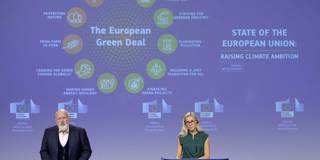EU Leaders Must Hold the Green Line
The European Union has taken monumental steps this year to deepen the bloc's integration and solidarity in the face of not just the pandemic but also the climate crisis. By threatening to derail this progress, Hungary and Poland have placed a risky bet, and other EU leaders must call their bluff.

PARIS – Historians will no doubt look back on 2020 as a turning point for the European Union. But which of two competing headlines will capture this critical moment?